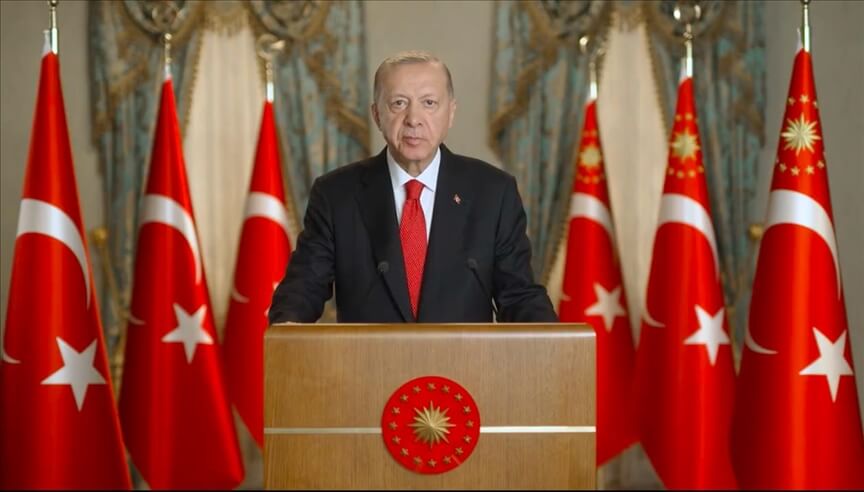In a video address to the second summit of the International Crimea Platform (ICP) on Tuesday, Turkish President Recep Tayyip Erdoğan asserted that Turkey “does not recognise the annexation of Crimea” by Russia in 2014, describing it as “illegitimate and illegal.”
“The return of Crimea to Ukraine, of which it is an inseparable part, is essentially a requirement of international law,” he declared, adding, “This is a principled stance that has not only legal but also moral foundations.” Erdoğan noted that defending Ukraine’s territorial integrity, sovereignty, and political unity is “critical” for regional and global security and stability.
He also reiterated that he expects Nariman Dzhelyal, the deputy chairman of the Crimean Tatar Mejlis, and at least 45 other Crimean Tatars who were detained by Russia in 2021, to be released. “Ensuring the safety and well-being of our Crimean Tatar compatriots is also among Turkey’s priorities,” Erdoğan stated. He added that Turkey will continue to support the Ukrainian government and the Crimean Tatars, “who have suffered great pains throughout history, are fighting for a peaceful life in their homeland.”
Türkiye supports the preservation of Ukraine's territorial integrity, sovereignty and political unity — President Erdogan pic.twitter.com/SGx6fBU3cV
— TRT World Now (@TRTWorldNow) August 23, 2022
In this respect, Ukrainian President Volodymyr Zelensky remarked in his opening address to the summit that “the degradation of Russia began with the seizure of Crimea” and the “terror against the Crimean Tatar people,” which became “the largest religious persecution in Europe in the 21st century.”
Noting that Ukraine regaining control of Crimea will be a “historic anti-war step in Europe,” he revealed that Kyiv had adopted the law on Indigenous people that protected the rights of the Crimean Tatar people and Mejlis, Karaites, and Krymchaks. “We are developing the Crimean Tatar language,” he added. Zelensky also read a few excerpts from Dzehlyal’s letter, who he said was detained for attending the first ICP summit last year.
In a joint statement, the ICP participants also urged Russia to “immediately and unconditionally release Ukrainian prisoners unjustly detained in Crimea and the territory of Russia,” including Dzhelyal, and “to refrain from maintaining the ban on the Mejlis of the Crimean Tatar people.”
Furthermore, the statement raised concerns “about the increase in repressive measures by Russian occupying authorities, including abuses of human rights of Indigenous Crimean Tatars severely threatening their ability to fully enjoy their human rights, maintain and develop their culture, education and identity.” The ICP said it is “deeply concerned” about Ukrainian civilians and prisoners of war, including Crimean Tatars, being forcefully transferred from southern and eastern Ukraine to Crimea and Russia.
Erdogan emphasized Turkey's commitment to the rights of Crimean Tatars at the Crimea Platform
— Samuel Ramani (@SamRamani2) August 23, 2022
The arrest of Crimean Tatar Mejlis Deputy Chairman Nariman Dzhelyal and 45 other Crimean Tatars in 2021 is a sore point between Turkey and Russia
In this regard, Erdoğan affirmed Turkey’s steadfast support for the ICP, which was established to resolve the Crimea dispute through peaceful means. He also noted that Ankara would continue to mediate talks between Kyiv and Moscow in an effort to promote peace in the region.
Erdoğan’s criticism of Russia’s annexation of Crimea and simultaneous offer to mediate the Ukraine war is symbolic of the uneasy relationship between the two countries.
Last month, the two countries came together to condemn Israel’s continued military attacks on Syria last month, saying that its aggression is “destabilising and intensifying the tension” in the Middle East.
This seems important. Turkey has always been uneasy about Russia's annexation of Crimea, largely due to its sense of responsibility for Crimean Tatars. But this is the first time can remember a statement this definitive. https://t.co/aTAL1gidKO
— Bob Hamilton (@bobham88) August 23, 2022
In addition, following a meeting with Putin in Sochi, Erdoğan announced that Turkey will pay for some Russian gas imports in rubles and extend the use of Russia’s Mir payment system. In fact, Moscow is Ankara’s third-largest supplier of natural gas and accounts for a quarter of its gas imports. Russia is also Turkey’s largest supplier of crude oil, providing Turkey with almost half of its oil.
Erdoğan has met Putin twice during the ongoing Ukraine war and was instrumental in mediating peace talks between Russia and Ukraine during the beginning of the invasion in February. Though those talks were ultimately unsuccessful, Erdoğan has indicated his commitment “to the continuation of diplomatic talks” and emphasised that Turkey is willing “to do its part for the de-escalation of tensions and the preservation of peace.”
In this regard, in June, Erdoğan conveyed his willingness to host Putin and Zelensky and start negotiations regarding facilitating agricultural exports. A month later, Ukraine, Russia, Turkey, and the United Nations (UN) agreed to resume Ukrainian grain exports through the Black Sea.
People’s Deputy of Ukraine, leader of the Crimean Tatar people Mustafa Dzhemilev condemned any calls to cede the territory of the temporarily occupied Crimea in favor of Russia. pic.twitter.com/GxBTg2VQCr
— Crimea Platform (@crimeaplatform) August 23, 2022
At the same time, however, the Turkish leader has told Putin that he does not recognise Russia’s move to recognise the independence of Ukraine’s breakaway regions of Donetsk and Luhansk, before offering to mediate the crisis.
He also agreed to “pave the way” for Sweden and Finland to join the North Atlantic Treaty Organization (NATO) in June.
Moreover, right before the Ukraine war began in February, he signed a new deal with Zelensky that expanded the production of Turkey’s Bayraktar TB2 military drones in Ukraine.
Around this same time, tensions between the two sides also simmered after Turkey also vowed to implement the Montreux Convention to limit Russia’s access to the Black Sea, with Foreign Minister Mevlüt Çavuşoğlu saying that Russia’s assault on Ukraine had turned into a “war” and therefore permitted Turkey to limit the passage of Russian warships from the Mediterranean Sea to the Black Sea via the Dardanelles and Bosporus straits.

